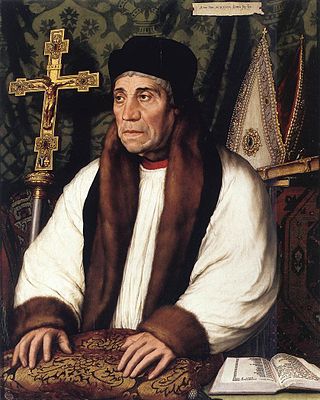
Robert Grosseteste, also known as Robert Greathead or Robert of Lincoln, was an English statesman, scholastic philosopher, theologian, scientist and Bishop of Lincoln. He was born of humble parents in Suffolk, but the associations with the village of Stradbroke is a post-medieval tradition. Upon his death, he was revered as a saint in England, but attempts to procure a formal canonisation failed. A. C. Crombie called him "the real founder of the tradition of scientific thought in medieval Oxford, and in some ways, of the modern English intellectual tradition".
Adam Marsh was an English Franciscan, scholar and theologian. Marsh became, after Robert Grosseteste, "...the most eminent master of England."

Walter Map was a medieval writer. He wrote De nugis curialium, which takes the form of a series of anecdotes of people and places, offering insights into the history of his time.

William Warham was the Archbishop of Canterbury from 1503 to his death.

Sir John Mason was an English diplomat and spy.
Junius was the pseudonym of a writer who contributed a series of political letters critical of the government of King George III to the Public Advertiser, from 21 January 1769 to 21 January 1772 as well as several other London newspapers such as the London Evening Post.
William de La Mare was an English Franciscan theologian.
The Lady Margaret Professorship of Divinity is a senior professorship in Christ Church of the University of Oxford. The professorship was founded from the benefaction of Lady Margaret Beaufort (1443–1509), mother of Henry VII. Its holders were all priests until 2015, when Carol Harrison, a lay theologian, was appointed to the chair.
Robert of Lexinton was a British judge and administrator.
The post of Lord President of Munster was the most important office in the English government of the Irish province of Munster from its introduction in the Elizabethan era for a century, to 1672, a period including the Desmond Rebellions in Munster, the Nine Years' War, and the Irish Rebellion of 1641. The Lord President was subject to the Lord Deputy of Ireland, but had full authority within the province, extending to civil, criminal, and church legal matters, the imposition of martial law, official appointments, and command of military forces. Some appointments to military governor of Munster were not accompanied by the status of President. The width of his powers led to frequent clashes with the longer established courts, and in 1622 the President, Donogh O'Brien, 4th Earl of Thomond, was warned sharply not to "intermeddle" with cases which were properly the business of those courts. He was assisted by a Council whose members included the Chief Justice of Munster, another justice and the Attorney General for the Province. By 1620 his council was permanently based in Limerick.
George Heneage was an English churchman who became Dean of Lincoln.
William Watts (c.1590–1649) was an English cleric and author. He was Rector of St Alban, Wood Street, London, served as chaplain to Prince Rupert of the Rhine, and published a translation of Augustine's Confessions in 1631, which serves as the principal text of the Loeb Classical Library two volume edition of the work.
Annals of Philosophy; or, Magazine of Chemistry, Mineralology, Mechanics, Natural History, Agriculture and the Arts was a learned journal founded in 1813 by the Scottish chemist Thomas Thomson. It shortly became a leader in its field of commercial scientific periodicals. Contributors included John George Children, Edward Daniel Clarke, Philip Crampton, Alexander Crichton, James Cumming, John Herapath, William George Horner, Thomas Dick Lauder, John Miers, Matthew Paul Moyle, Robert Porrett, James Thomson, and Charles Wheatstone.
John Walton, also John Capellanus was an English Augustinian canon, known as a poet and translator.
John of Basingstoke, also called John Basing, was an Archdeacon of Leicester in the 13th century. Basingstoke was an advocate of Greek literacy and seems to have been instrumental in introducing the apocryphal Testament of the Twelve Patriarchs to Robert Grosseteste, bishop of Lincoln. What is known of Basingstoke derives primarily from the writings of Grosseteste and another contemporary, Matthew Paris.
George Gresley Perry (1820–1897) was an English churchman and academic, known as a church historian and Archdeacon of Stow.
The Aldersgate Medical School was a medical school in east London, in existence from about 1825 to 1848. One of many private medical schools of the period, it had popular lecturers on its staff, and proved a serious rival to St. Bartholomew's Hospital as a teaching institution.
Edmund Venables was an English cleric and antiquarian.
Thomas Rudge was an English churchman, topographer and antiquarian, Archdeacon of Gloucester from 1814, and chancellor of the diocese of Hereford from 1817.
Thomas Skevington was an English Cistercian monk, abbot of Waverley Abbey and Beaulieu Abbey, and bishop of Bangor from 1509.
![]() This article incorporates text from a publication now in the public domain : Lee, Sidney, ed. (1899). "Wallensis, Thomas (d.1255)". Dictionary of National Biography . Vol. 59. London: Smith, Elder & Co.
This article incorporates text from a publication now in the public domain : Lee, Sidney, ed. (1899). "Wallensis, Thomas (d.1255)". Dictionary of National Biography . Vol. 59. London: Smith, Elder & Co.


